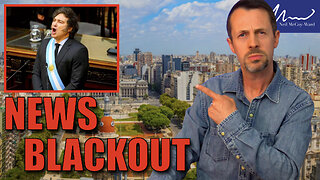Premium Only Content

Episode 1295: City of God - St. Augustine - Book 1 - Earthly Happiness vs. Eternal Happiness
Book 1 of the City of God serves as an introduction to the overarching themes and purpose of Augustine's work. Here's a summary of its main points:
Augustine begins by addressing the recent sack of Rome in 410 AD by the Visigoths. Some people attributed this disaster to the abandonment of traditional Roman deities and the rise of Christianity. Augustine aims to provide a response to these accusations and to offer a comprehensive understanding of the relationship between the earthly city and the city of God.
He explains that there are two cities or societies that exist side by side throughout history: the earthly city (civitas terrena) and the city of God (civitas Dei). These two cities are distinct in their nature, goals, and ultimate destiny.
The earthly city is characterized by the pursuit of earthly pleasures, power, and self-gratification. It is driven by human desires and seeks temporal happiness. Augustine acknowledges that while there may be moments of order and justice within the earthly city, it is inherently flawed and subject to sin and corruption.
On the other hand, the city of God consists of those who seek the love of God and eternal life. It is a spiritual realm that transcends earthly concerns and is founded upon the principles of righteousness, justice, and peace. Augustine argues that the city of God represents the ultimate fulfillment and happiness of humanity.
Augustine addresses the criticisms against Christianity, particularly those that attribute the fall of Rome to the abandonment of traditional gods. He counters these claims by arguing that the rise and fall of earthly cities are temporary and ultimately inconsequential in the grand scheme of things. True and lasting happiness can only be found in the city of God, which is established by God's grace and guided by divine providence.
Augustine concludes Book 1 by stating his intention to refute the accusations against Christianity and to present a comprehensive analysis of the two cities throughout history. He lays the groundwork for the subsequent books, where he will delve into various topics such as philosophy, theology, history, and the destiny of individuals and societies in the context of the two cities.
In summary, Book 1 of the City of God sets the stage for Augustine's exploration of the contrasting nature and destinies of the earthly city and the city of God. It establishes the foundation for his argument that true happiness and fulfillment are found in the pursuit of the divine rather than in earthly pursuits.
Book 1 of the City of God is an introductory book that sets the stage for Augustine's larger argument and addresses specific criticisms against Christianity. Here's a more detailed breakdown of the key points covered in Book 1:
Historical Context: Augustine begins by addressing the recent sack of Rome in 410 AD by the Visigoths. This event shook the Roman Empire, and some people blamed the fall of Rome on the abandonment of traditional Roman gods and the rise of Christianity. Augustine aims to provide a response to these accusations and to offer a comprehensive understanding of the relationship between the earthly city and the city of God.
Here are some additional details:
Sack of Rome: In 410 AD, Rome, the capital of the Western Roman Empire, was sacked by the Visigoths led by their king, Alaric. This event had a profound impact on the Roman Empire and its inhabitants. The sack of Rome was a significant blow to the prestige and perceived invincibility of the Roman Empire, as the city had not been captured by an enemy force in nearly eight centuries.
Blaming Christianity: Following the sack of Rome, there were those who attributed the fall of the city to the abandonment of the traditional Roman gods and the rise of Christianity. They argued that Rome's strength and protection had been compromised by the waning adherence to the traditional religious practices of the Roman state.
Anti-Christian Sentiment: The sack of Rome intensified existing anti-Christian sentiment among some circles within the Roman Empire. These individuals saw Christianity as a threat to the traditional Roman way of life and accused Christians of being responsible for Rome's misfortunes. The rise of Christianity and its growing influence in the empire became a point of contention and blame.
Intellectual Climate: The period leading up to the sack of Rome was marked by a clash between traditional Roman religious beliefs and the growing influence of Christianity. This intellectual climate contributed to debates and criticisms surrounding the role of religion, the nature of divine protection, and the relationship between religious practices and worldly success.
Augustine's Response: Augustine, a prominent Christian theologian and philosopher, wrote the City of God as a response to these accusations and criticisms against Christianity. He aimed to address the claims that the fall of Rome was a result of abandoning the traditional gods and to provide a comprehensive understanding of the nature of the earthly city and the city of God.
In Book 1, Augustine engages with the historical context of the sack of Rome and the anti-Christian sentiment that followed. He presents a Christian perspective on the events and challenges the notion that the rise and fall of cities are solely determined by adherence to particular religious practices. Augustine seeks to provide a broader understanding of the nature of divine providence and the pursuit of true happiness in the context of the earthly city and the city of God.
Two Cities: Augustine introduces the central theme of his work, the concept of two distinct cities: the earthly city (civitas terrena) and the city of God (civitas Dei). He explains that these two cities coexist throughout history and have different principles, goals, and destinies. The earthly city is driven by worldly desires and seeks temporal happiness, while the city of God is founded on the love of God and the pursuit of eternal life.
Here's more on the two cities:
Earthly City (civitas terrena): The earthly city refers to human society organized according to worldly principles. It is characterized by the pursuit of temporal and earthly goods such as power, wealth, pleasure, and self-gratification. Augustine acknowledges that the earthly city can have moments of order, justice, and even virtue, but it is fundamentally flawed due to human sinfulness and the transience of earthly pursuits. People within the earthly city are motivated by self-interest and seek happiness in temporal achievements.
City of God (civitas Dei): The city of God represents a spiritual realm that transcends earthly concerns. It is founded on the love of God and the pursuit of eternal life. Augustine argues that true and lasting happiness can only be found in the city of God. It is characterized by righteousness, justice, and peace, as it aligns with God's will. Augustine presents the city of God as the ultimate destiny and fulfillment of humanity.
Coexistence and Conflict: Augustine emphasizes that the two cities coexist in the world throughout history. They are intertwined and interact with each other, often in a state of tension and conflict. The inhabitants of the two cities are distinguishable not by physical location but by their orientations, allegiances, and ultimate goals. The earthly city is driven by worldly desires, while the city of God seeks a higher spiritual purpose.
Destiny and Judgment: Augustine explores the different destinies of the two cities. He argues that the earthly city is transient and subject to decay and destruction, while the city of God is eternal and immune to such decay. Augustine presents the final judgment as the ultimate separation of the two cities, where the righteous inhabitants of the city of God will attain eternal bliss, while the wicked in the earthly city will face divine punishment.
Christian Life in the World: Augustine provides guidance on how Christians should navigate their lives within the earthly city. He encourages Christians to participate in society, fulfilling their earthly responsibilities, while prioritizing their allegiance to the city of God. Christians are called to be agents of righteousness and love, striving to bring the values of the city of God into the earthly city.
The concept of the two cities allows Augustine to examine various aspects of human existence, including politics, philosophy, morality, and theology. It provides a framework for understanding the tension between earthly pursuits and spiritual aspirations and underscores the ultimate significance of seeking the city of God for true fulfillment and happiness.
Criticisms Against Christianity: Augustine addresses the specific criticisms that were leveled against Christianity in the wake of Rome's fall. He responds to the accusation that the abandonment of traditional gods had brought about the downfall of Rome. Augustine argues that the rise and fall of earthly cities are transient and subject to various factors, and that true happiness and salvation lie in the pursuit of the city of God.
Here are some additional details on the criticisms and Augustine's response:
Blaming Christianity for Rome's Fall: Following the sack of Rome, some critics blamed the rise of Christianity and the abandonment of traditional Roman gods for the decline of the Roman Empire. They argued that Rome's strength and protection had been compromised by the growing influence of Christianity and the waning adherence to the traditional religious practices of the Roman state.
Allegations of Impiety: Christianity was accused of impiety and atheism because it rejected the worship of the traditional Roman gods. Critics believed that the neglect of these gods angered the divine powers and led to the loss of divine protection over Rome.
Decline of Traditional Values: Critics argued that the spread of Christianity had undermined traditional Roman values and virtues. They claimed that Christian teachings, such as turning the other cheek and emphasizing humility, were incompatible with the ideals of Roman strength, power, and military prowess.
Loss of Roman Identity: Some critics contended that the rise of Christianity threatened the traditional Roman way of life and eroded the cultural and social fabric of the empire. They saw Christianity as a foreign and subversive influence that weakened the Roman identity and social cohesion.
Ineffectiveness of Christian Prayers: Critics questioned the effectiveness of Christian prayers and argued that the abandonment of the Roman gods had left Rome vulnerable to attacks and misfortunes. They believed that the traditional gods had previously protected Rome, and the neglect of their worship had resulted in Rome's downfall.
Augustine responds to these criticisms in several ways:
a. Divine Providence: Augustine argues that the rise and fall of earthly cities, including Rome, are not solely determined by religious practices but are part of God's larger plan and providential guidance. He asserts that God's wisdom and providence extend beyond the earthly realm and that temporal events should be understood in the context of divine governance.
b. Transience of Earthly Cities: Augustine emphasizes that the earthly city is inherently flawed and subject to decay and corruption. He suggests that focusing solely on the prosperity and success of the earthly city is misguided, as its ultimate destiny is fleeting and inconsequential compared to the eternal city of God.
c. True Happiness in the City of God: Augustine argues that true happiness and fulfillment are found in the pursuit of the city of God rather than in the pursuit of worldly desires. He presents the city of God as the ultimate goal and the source of eternal bliss, contrasting it with the fleeting happiness pursued by the earthly city.
d. Christian Morality and Virtue: Augustine defends Christian morality and virtue, arguing that they promote a higher standard of ethics and spiritual well-being. He contends that the Christian teachings of love, humility, and forgiveness contribute to the flourishing of individuals and society, rather than being detrimental to traditional Roman values.
By addressing these criticisms, Augustine seeks to demonstrate the superiority of the Christian faith and to present a comprehensive understanding of the relationship between the earthly city and the city of God. He emphasizes that true happiness and salvation are found in the pursuit of the city of God rather than in the adherence to the traditional Roman gods or the achievements of the earthly city.
Earthly Happiness vs. Eternal Happiness: Augustine distinguishes between the temporary happiness sought by the earthly city and the eternal happiness found in the city of God. He asserts that the pursuit of earthly pleasures and power is ultimately unsatisfying and subject to decay and corruption. In contrast, the city of God offers lasting happiness and fulfillment through the love of God and the attainment of eternal life.
Here are more details on this topic:
Earthly Happiness: Augustine argues that earthly happiness is transient and ultimately unsatisfying. It is based on the pursuit of temporal goods such as wealth, power, pleasure, and worldly success. Augustine acknowledges that there can be moments of joy and contentment within the earthly city, but these pleasures are fleeting and subject to change. Earthly happiness is often rooted in material possessions and the fulfillment of immediate desires, but it does not lead to lasting fulfillment or the ultimate purpose of human existence.
Limitations of Earthly Happiness: Augustine emphasizes the limitations of earthly happiness. He asserts that it is limited by time, as everything in the earthly city is subject to decay, change, and eventual death. Augustine also argues that earthly happiness is limited by the flawed nature of human desires and the ever-changing circumstances of life. Pursuing temporal goods as the sole source of happiness can lead to disappointment, dissatisfaction, and an insatiable longing for more.
Eternal Happiness:
Augustine presents eternal happiness as the true and ultimate goal of human existence. It is found in the pursuit of the city of God, which is founded on the love of God and the attainment of eternal life. Eternal happiness transcends the limitations of the earthly city and is not dependent on material possessions or temporal pleasures. Augustine argues that only in the city of God can one find lasting fulfillment, peace, and the complete satisfaction of the soul.
Divine Love and Union with God: Augustine emphasizes that eternal happiness is intimately connected to the love of God and the union of the soul with the divine. He argues that the human soul has an innate longing for God and that true happiness can only be achieved through a loving relationship with the divine. Augustine sees the pursuit of eternal happiness as a journey towards God, where the soul is united with its ultimate source and finds perfect fulfillment and joy.
Christian Faith and Eternal Happiness:
Augustine asserts that the Christian faith offers the path to eternal happiness. He sees Christianity as providing the means for the soul's transformation and its ultimate union with God. Through faith, baptism, and participation in the sacraments, individuals can enter into a relationship with God and experience the transformative power of divine grace, leading to eternal happiness.
In summary, Augustine contrasts earthly happiness, which is fleeting and limited, with eternal happiness, which is found in the pursuit of the city of God and the love of God. He argues that true and lasting fulfillment can only be achieved by transcending the pursuits of the earthly city and seeking the higher spiritual purpose of the city of God.
Divine Providence: Augustine introduces the concept of divine providence, asserting that the events of human history are guided by God's wisdom and plan. He argues that the rise and fall of empires, including Rome, are part of God's larger design and serve as a means to fulfill His purposes.
Here's more information on divine providence:
God's Sovereignty: Augustine asserts that God is the supreme ruler and governor of the universe. Divine providence encompasses God's omniscience, omnipotence, and benevolence. Augustine argues that God's providential care extends to every aspect of creation, from the movements of celestial bodies to the tiniest details of individual lives.
Order and Purpose: Augustine presents divine providence as the underlying principle that establishes order and purpose in the world. He argues that all events and circumstances are part of God's larger plan, working together for the fulfillment of His purposes. Even though human actions may seem chaotic or random, Augustine maintains that they are ultimately governed by God's providential wisdom.
Role of Human Freedom: Augustine addresses the relationship between divine providence and human free will. He reconciles the existence of human choice and responsibility with the overarching control of God's providence. Augustine argues that while individuals have the freedom to make choices, God's providence can work through and beyond human actions to accomplish His ultimate intentions.
Response to Evil and Suffering: Augustine grapples with the question of evil and suffering in light of divine providence. He acknowledges the presence of evil and the existence of human suffering, but maintains that God's providential plan includes the allowance of such evils for a greater purpose. Augustine suggests that human suffering can lead to spiritual growth, purification, and ultimately, the recognition of one's dependence on God.
Divine Justice and Judgment: Augustine connects divine providence to the concepts of divine justice and judgment. He argues that God's providence ensures that justice is ultimately served, even if it may not be apparent in the immediate circumstances of the world. Augustine asserts that the final judgment will reveal the full extent of God's providential plan and the just rewards or punishments for human actions.
Trust and Faith: Augustine encourages individuals to trust in God's providence and to have faith that His plans are ultimately for the good. He suggests that the acceptance of God's providence can bring peace and contentment, even in the face of difficulties and uncertainties.
In summary, divine providence in Augustine's City of God refers to God's overarching governance and guidance of the world. It encompasses God's sovereignty, the establishment of order and purpose, the compatibility of human freedom with divine providence, the response to evil and suffering, divine justice, and the importance of trust and faith in God's plan. Augustine presents divine providence as a source of comfort, assurance, and hope in the face of the complexities of human existence.
Purpose of the Work: Augustine concludes Book 1 by stating his intention to refute the accusations against Christianity and to present a comprehensive analysis of the two cities throughout history. He aims to demonstrate the superiority of the city of God and the futility of earthly pursuits in achieving true and lasting happiness.
Here are some key aspects of the purpose of the work:
Defending Christianity: One of the primary purposes of the City of God is to defend Christianity against the criticisms and accusations that arose in the aftermath of the sack of Rome. Augustine responds to the claim that the fall of Rome was due to the abandonment of the traditional Roman gods and the rise of Christianity. He provides a comprehensive defense of the Christian faith, asserting that the city of God and its pursuits are ultimately superior to the earthly city and its temporal concerns.
Addressing the Crisis of the Roman Empire: The City of God seeks to address the crisis and decline of the Roman Empire by providing a philosophical and theological framework for understanding the events. Augustine examines the nature of human societies, the causes of their rise and fall, and the role of divine providence in shaping history. He offers an alternative perspective on the significance of earthly cities, emphasizing the primacy of the city of God and its eternal values.
Providing a Christian Worldview: Augustine aims to present a comprehensive Christian worldview that encompasses philosophy, history, theology, and ethics. The work delves into various philosophical topics, including the nature of evil, human nature, the pursuit of happiness, and the role of divine grace. Augustine draws from biblical teachings, philosophical traditions, and his own theological insights to construct a cohesive and intellectually robust framework for understanding the human condition and the purpose of life.
Offering Comfort and Hope: The City of God seeks to provide comfort and hope to Christians in a time of uncertainty and upheaval. Augustine assures his readers that despite the decline and fall of earthly powers, the city of God endures and offers true happiness and salvation. The work encourages believers to find solace in their faith and to recognize the ultimate significance of their eternal citizenship in the city of God.
Engaging with Philosophical and Historical Discourse: Augustine engages with various philosophical and historical ideas prevalent in his time. He incorporates elements of Neoplatonism, Stoicism, and Roman history into his arguments and critiques. By engaging with these intellectual currents, Augustine seeks to demonstrate the compatibility of Christian thought with broader philosophical and historical discussions, as well as the unique insights Christianity offers in understanding the human condition.
In summary, the purpose of the City of God is to defend Christianity, address the crisis of the Roman Empire, provide a comprehensive Christian worldview, offer comfort and hope, and engage with philosophical and historical discourse. Augustine's work seeks to provide a theological and philosophical framework that reconciles the challenges and uncertainties of the earthly city with the enduring values and eternal truths of the city of God.
In Book 1, Augustine lays the foundation for his overarching argument and provides a framework for understanding the contrast between the earthly city and the city of God. He addresses specific criticisms against Christianity and introduces key concepts such as the pursuit of happiness, divine providence, and the differing destinies of the two cities. This sets the stage for the subsequent books, where Augustine delves into a wide range of topics to support his thesis.
-
 LIVE
LIVE
Wendy Bell Radio
4 hours agoOn Day One
9,333 watching -
 LIVE
LIVE
Jeff Ahern
1 hour agoFriday Freak out with Jeff Ahern (6am Pacific)
285 watching -
 LIVE
LIVE
Game On!
9 hours agoJosh Allen is the NFL MVP! It's not even close!
235 watching -
 DVR
DVR
Neil McCoy-Ward
29 minutes agoWhy The Media Won't Tell You What Milei Did In Argentina...
-
 3:56:44
3:56:44
Alex Zedra
12 hours agoLIVE! Trying to get achievements in Devour
164K24 -
 2:00:43
2:00:43
The Quartering
15 hours agoThe MAGA Wars Have Begun! Vivek & Elon Get Massive Backlash & Much More
175K70 -
 1:25:53
1:25:53
Kim Iversen
3 days agoStriking Back: Taking on the ADL’s Anti-Free Speech Agenda
118K96 -
 49:35
49:35
Donald Trump Jr.
18 hours agoA New Golden Age: Countdown to Inauguration Day | TRIGGERED Ep.202
222K204 -
 1:14:34
1:14:34
Michael Franzese
17 hours agoWhat's Behind Biden's Shocking Death Row Pardons?
86.4K50 -
 9:49
9:49
Tundra Tactical
16 hours ago $26.55 earnedThe Best Tundra Clips from 2024 Part 1.
154K12